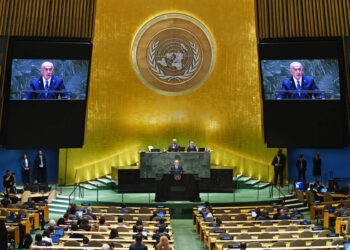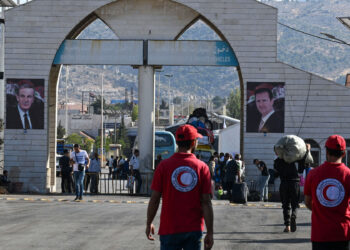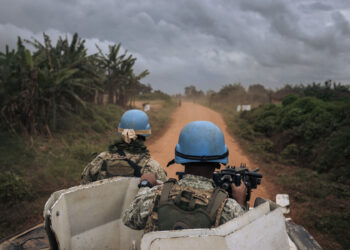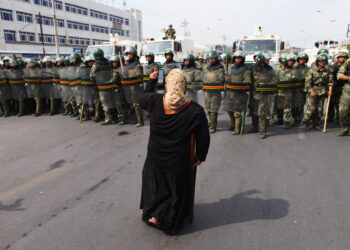Sayed Yusuf Almuhafdha is a Bahraini human rights activist and blogger, living in exile in Germany.
عربي
Eleven years ago this week, a civil uprising called for democracy, justice and respect for human rights in Bahrain. Inspired by demonstrations in Egypt and Tunisia, this peaceful movement took over the streets of cities and towns across the small island country, briefly turning Manama's central Pearl Roundabout into a protest camp. It was met with a systematic crackdown. Bahraini police stormed the Pearl Roundabout, killing protesters and demolishing their camp. By the time the uprising was crushed—with the help of Saudi troops, as King Hamad bin Isa Al Khalifa declared a "state of emergency"—security forces in Bahrain had killed dozens of protesters and arrested hundreds more, many of whom were tortured in their custody. Thousands of workers were later fired just for participating in the protests.
In response to international condemnation in the aftermath of the crackdown, King Hamad announced the establishment of an independent commission to investigate these abuses, chaired by M. Cherif Bassiouni, an Egyptian law professor at DePaul University. The Bahrain Independent Commission of Inquiry, or BICI, explicitly documented torture by Bahrain's security forces and criticized their "culture of impunity." The commission presented its report in November 2011 in a plenary session before the king, who accepted its findings and promised to implement its recommendations for fundamental human rights reforms.
But ever since then, little has actually been done. Despite the report's conclusions, and its own promises to act on them, the government still has never held members of the security services accountable for extrajudicial killings. Detainees have been continually mistreated and even tortured, according to credible allegations. The arrest powers of the abusive National Security Agency, which were rescinded by royal decree in late 2011, as the commission recommended, were later restored in 2017, again by royal decree.
The human rights reforms urgently needed in Bahrain today require sincere political will that acknowledges the roots of this crisis.
- Sayed Yusuf Almuhafdha
The initiatives that Bahrain's government has undertaken to carry out the commission's recommendations also have not played a genuine role in improving the human rights situation in the country. Rather than address human rights concerns, they sought instead to divert the world's attention from these violations in Bahrain. The latest maneuver was in September 2020, when the government announced that it was developing a "National Action Plan for Human Rights" for the years 2022 to 2026. If the government was serious about preparing and implementing such a national plan, it would not have excluded the United Nations, including its Office of the U.N. Commissioner for Human Rights, and civil society organizations in Bahrain.
The government continues to ignore the heart of the matter: finding solutions to the country's human rights and political crisis, which are one and the same. After the death of then-Prime Minister Khalifa bin Salman Al Khalifa in November 2020, Crown Prince Salman bin Hamad Al Khalifa was appointed prime minister. Many Bahrainis and international observers hoped that he would finally carry out genuine human rights and political reform in the country, living up to the promise of the independent commission, but this optimism was misplaced. Since taking office, the new prime minister has not taken any worthwhile steps to address human rights violations or political abuses, instead focusing his efforts on the economy, which has only kept Bahrain mired in turmoil.
The Bahraini government still won't resolve the underlying causes of this crisis, such as the issue of political prisoners and the need for serious investigations of extrajudicial killings and systematic torture, in order to prevent these abuses from happening again. When presented with the independent commission's report on the crushed uprising in late 2011, King Hamad himself said he was "determined, God willing, to ensure that the painful events are not to be repeated, but that we learn from them."
The human rights reforms urgently needed in Bahrain today require sincere political will that acknowledges the roots of this crisis. The government's focus on economic development cannot be sustainable unless there is a society to support it and real internal stability.
We aspire for our rights to be implemented permanently and not to be subject to the Bahraini government's own whims, or confiscated simply because we hold political positions they don't agree with.
- Sayed Yusuf Almuhafdha
The path to reform is clear and does not need to waste more years. Political detainees should be released and their death sentences lifted. The government should also reverse its decisions to revoke the citizenship of many opposition figures. It should put an end to sectarian discrimination. Civil society institutions must be able to operate freely in Bahrain, in an environment where there is freedom of opinion, expression, belief and of the press, and freedom of peaceful assembly. This could all pave the way for a national project for transitional justice. There are successful examples of transitional justice laws and the establishment of truth and reconciliation committees in the Arab world—namely in Tunisia and Morocco—inspired by the lessons of South Africa.
For four years, the Bahraini government benefited from Donald Trump's presidency in the United States, as Trump prioritized arms deals and trade relations, especially with wealthy Gulf countries, at the expense of any consideration for human rights. President Joe Biden pledged to put human rights "at the center of U.S. foreign policy," but civil society organizations in Bahrain and internationally are still waiting on that promise. Will Biden's administration fulfill its human rights commitments and not to be compromised at the expense of its stated principles?
Bahrainis' rights are guaranteed in Bahraini law, under its constitution, as well as in international conventions and agreements ratified by Bahrain's government. We aspire for these rights to be implemented permanently and not to be subject to the government's own whims, or confiscated simply because we hold political positions or opinions that the authorities don't agree with.







